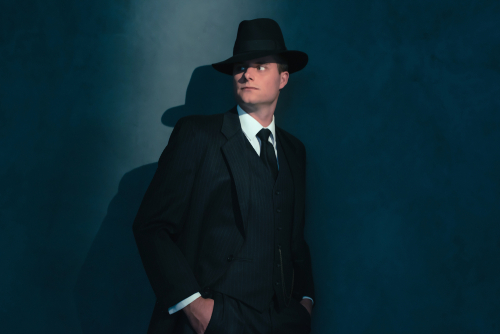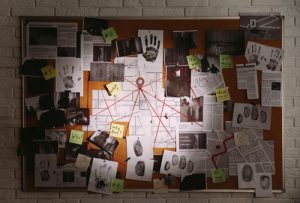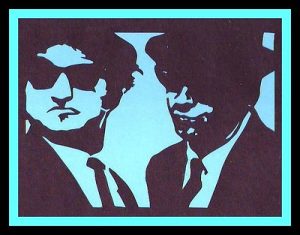
The inexplicable disappearance of Lord Lucan
In November 1974, a member of the British aristocracy became embroiled in the brutal murder of his children’s live-in nanny. His last official sighting was a few hours after the grisly episode. Richard John Bingham, better known as Lord Lucan, then mysteriously disappeared without a trace. Inevitably, there has been much supposition and theory about both the killing and the fugitive peer’s life on the run.
Lucky Lord Lucan (Richard John Bingham)
Richard John Bingham, the future 7th Earl of Lucan, was born in Marylebone, London on the 18th December 1934. His privileged background gave him the opportunity for the very best education. It was at Eton that he was to develop his great obsession for gambling. In 1953 he joined the Coldstream Guards, where he spent much of his off-duty time playing poker and visiting casinos. In 1954, after leaving the Army, he became a Merchant Banker, but gambling remained his true passion. Following a substantial win in 1960, he decided to quit his job and become a professional gambler. He gave himself the gambling nickname of “Lucky”.
Married Life of Lord Lucan
In March 1963, John Bingham was introduced to Veronica Duncan, whom he married the following November.

Lord and Lady Lucan in 1963. Image credit: Wikipedia Commons
Two months later, John Bingham’s father died, and the couple became the 7th Earl and Countess of Lucan. It wasn’t long before the Lucan’s moved into the Lower Belgrave Street address. And soon after, on 24th October 1964 their first child, Frances, was born. By this time, Lucan’s nights were often spent at London’s gaming tables. On many occasions, he would not return home until 6 am. The Clermont Club, a notorious hangout of some of London’s richest, was his favourite haunt.
In September 1967, their son George was born, followed in June 1970, by another daughter, Camilla. By this time, Lady Lucan’s time was totally taken up caring for the children, looking after the house, and supervising the staff. She had little time or opportunity for outside interests and went on to develop post-natal depression. Lord Lucan took an interest in her condition and encouraged her to have treatment. However, her (poor quality) therapy proved to be ineffectual, fuelling a breakdown of the already fraught relationship with her husband. Lady Lucan had become increasingly concerned about her husband’s continued heavy gambling losses. She felt that Lord Lucan should seek help for his gambling addiction. However, he won’t listen, even failing to put money aside for their children’s education.
A Failing Marriage
The Lucan’s relationship continued to deteriorate, and following a tumultuous Christmas in 1972, they separated. However, Lord Lucan was determined to gain custody of his children. In March 1973, he obtained a court order and managed to gain temporary care. Lady Lucan became further depressed, spending a week in a psychiatric clinic. Lucan was hoping that Lady Lucan’s medical reports would show that she was unfit to be a mother. (In the 1970s, it was usual for Peers of the Realm to win custody of their children). So, by the time of the custody hearing in June 1973, Lord Lucan would have felt confident he would be granted permanent ward of his offspring. However, the Court ordered that the children must be returned to their mother.
Lucan had a family to support, a nanny to pay, houses to maintain, legal bills to pay, and continuing gambling losses. Consequently, he continued to add to his huge debts. However, Lucan was undeterred and still thought that he could regain custody of his children. He tried to buy Lady Lucan off with a sum of money, but that didn’t work. He bizarrely hired private detectives to watch the house. Oddly, he made secret tape recordings when collecting the children on parental access visits.
A Grisly Murder
Up until 9.45 pm on Thursday, 7th November 1974, locals were enjoying a run-of-the-mill evening at the Plumber’s Arms in Belgravia, Central London. A highly distressed woman, covered in blood, suddenly burst into the bar. She cried, “Help me, help me, help me. I’ve just escaped from being murdered. He’s in the house. He’s murdered the Nanny!” She was identified as Lady Lucan, who lived at 46 Lower Belgravia Road with her three children. She had clearly been the victim of a serious assault, so the police and ambulance service were immediately called.
The police officers who arrived at No. 46, forced open the front door and thoroughly searched the premises. They discovered the three children in their bedrooms, totally unharmed. The door to the basement was open, the investigating officers then descended the stairs to the breakfast room with some trepidation. There they found blood-splattered walls and a pool of blood on the floor. There was a trail of male footprints through the blood. Near the door leading to the kitchen, they found a bloodstained sack. Inside was the corpse of the children’s nanny, Sandra Rivett. She had been battered to death with a blunt instrument. In the hallway was the suspected murder weapon, a length of lead piping covered in bloodstained surgical tape. They found the back door of the house unlocked.
Lord Lucan – On the Run
Shortly after 10 pm, Mrs Madeleine Floorman, a friend of the Lucan’s, who lived close by, was dozing in front of the TV. She was awoken by the sound of the doorbell but assumed it to be a prank call by a local adolescent, so she ignored it! A little later, she received a mysterious phone call. She thought she recognised the mumbled, incoherent voice as being that of Lord Lucan. However, with the caller making no sense, she put the phone down.
Around 10.30 pm, Lord Lucan telephoned his mother at St John’s Wood, just over 3 miles from the murder scene. He told her that there had been an unfortunate incident at the house and asked her to collect the children as soon as possible. She went there almost immediately but was beaten to the residence by the police. She informed them that her son and Lady Lucan were separated but that he lived at a nearby flat. The police immediately sent a team to search the premises. They found Lord Lucan’s keys, passport, chequebook, driving license, wallet, and glasses there. His car, a blue Mercedes, was parked outside but found to have a flat battery. Lord Lucan himself was nowhere to be seen.
The Getaway

A Ford Corsair similar to the one driven by Lord Lucan on the night of the murder
It was discovered that Lord Lucan had been driving a Ford Corsair, which he had borrowed from a friend some 2 or 3 weeks earlier. Around 11.30 pm, he had arrived at the home of friends, Ian and Susan Maxwell-Scott, in Uckfield, Sussex (42 miles from the murder scene). Mr Scott was away for the night, but his wife, Susan, said that Lord Lucan had appeared in an uncharacteristically dishevelled, in a moody, agitated state.
He told Mrs Maxwell-Scott he had been walking past his former home when he thought he’d heard something. He claimed to have seen someone grappling with his wife in the kitchen. Thus, he let himself in through the front door and ran down the stairs. He then said he had slipped and fallen in a pool of blood, giving the intruder a chance to flee. He helped to calm Lady Lucan down, talking her upstairs to get cleaned up. However, while he himself was in the bathroom, she’d run out of the house screaming “murder”. He quickly realised things didn’t look too good for himself, panicked, and then decided to flee the scene.
Phone calls and Letters
Lord Lucan told Mrs Maxwell-Scott he had made three recent phone calls. The first to Mrs Floorman, a second to his mother, and the third to his wife’s brother-in-law, Bill Shand Kydd, who hadn’t picked up the phone. Fifteen minutes after midnight, he rang his mother from Maxwell-Scott’s house to check that she had the children. Lucan then rang Bill Shand Kydd again but again didn’t get a reply.
He then proceeded to write two letters, both addressed to Bill Shand Kydd. Indicating he was leaving, Mrs Maxwell-Scott tried to persuade Lord Lucan to go to the local police. His only retort was that he had to “get back”. Mrs Maxwell-Scott could not know that her’s would be the last validated sighting of Lord Lucan.
An Abandoned Car
Three days after the murder, the Ford Corsair was found abandoned in Newhaven in East Sussex, 16 miles from the Scotts’ home. Inside the car, they found Type A and Type bloodstains that corresponded to his wife’s and the nanny’s blood groups. They also discovered a piece of clean bandaged lead piping, similar to that found at the murder scene.
The Inquest of Sandra Rivett
The four-day inquest into the gruesome attack at the home of Lady Lucan was held in June 1975. In Lady Lucan’s police statement, she named her husband as her attacker and the murderer of Sandra Rivett. However, in court, she was only allowed to give evidence concerning the attack on herself. The court heard that 29-year-old Sandra was the same height and of a similar slim build as Lady Lucan. Lord Lucan was aware that through conversation with his children, that Thursdays were Sandra’s usual night off. However, unbeknown to him, she had agreed to work on the Thursday of that week.

46 Lower Belgrave Street (nearest house)
Lady Lucan’s recollection of the night was that at around 8.30 pm, the nanny put the two younger children to bed. Then around 8.40 pm, she went downstairs to make tea. After about twenty minutes or so after Sandra had gone downstairs, Lady Lucan began to wonder why she hadn’t returned. Around 9.15 p.m. Lady Lucan had descended the stairs to the ground floor, and then peered down into the basement.
There were no lights on, so she assumed that Sandra was not there. However, she then heard a noise from the downstairs cloakroom, from which someone suddenly sprang out. The attacker hit her on the head several times and then tried to strangle her. She had bravely fought back and managed to ward off the assault. The person who’d carried out the attack then told her to “shut up”. She recognised the voice as being that of her estranged husband. After a brief conversation, they had then gone upstairs to assess her injuries, and then Lucan went to the bathroom to get cleaned up. It was at that point, that Lady Lucan had taken the opportunity to run out of the house, making her way to the Plumbers Arms.
After Lady Lucan’s account of events, Lord Lucan’s first letter to Bill Shand Kydd was read out in court. In the letter, Lucan referred to interrupting a fight between his wife and a man, and that Lady Lucan accused him of hiring a hitman. Lady Lucan has denied making any such accusation, believing that the comment was designed to discredit any account she might give.
Lucan’s second letter referred to an upcoming sale at Christie’s where proceeds were to satisfy his bank overdrafts. He had signed it ‘Lucky’ his gambling nickname. His total overdraft was more than £14,000, although his overall debts were much more. The third letter from Lucan had been sent to the friend who had lent him the Ford Corsair. Lucan referred to “a traumatic night of unbelievable coincidences”, asking that his children should know that all he cared about was them.
The Verdict
Although various scenarios of the murder were put to the inquest jury, including the theory of an intruder, they reached a verdict in only 31 minutes. The judgment was that the murder of Sandra Rivett had been committed by Lord Lucan. It was the last time in a British court that an inquest jury was at a privilege to name a murderer.
As a direct result of the case, the right was abolished by the Criminal Law Act of 1977. However, Lucan’s friends and family were highly critical of the inquest. They felt it had presented a one-sided view of the events. Lord Lucan’s mother told reporters that the inquest hadn’t served “any useful purpose at all”. Lady Lucan’s sister, Christina, said that she felt “great sadness and sorrow” at the verdict.
Lord Lucan, Suicide or Life on the Run?
In the immediate aftermath of Sandra Rivett’s murder, some theorists supposed that Lord Lucan must have committed suicide given his inexplicable disappearance. If indeed he did, then no trace of body or belongings have ever been found. Those that knew Lucan well, including his wife, discarded the suicide notion. They all emphatically agreed that it would have been totally out of character. While there have been countless conspiracy theories about Lucan’s disappearance. The most viable seems to be that he managed to flee abroad.
In the 45 years since Lord Lucan disappeared, there have been numerous reported sightings of him across the globe. An eccentric homeless man, living with a pet goat, in New Zealand, claimed to be Lucan. Bounty hunter, John Miller, famed for his capture of the train robber, Ronnie Biggs, claimed to have captured Lucan in Columbia. However, this turned out to be a hoax. Proof of Lucan of being alive, or evidence of his existence since 1974, has never ever materialised.
A New Theory about Lord Lucan
Perhaps the most convincing theory as to the fate of Lord Lucan came from a BBC report in 2012. A former personal assistant to Lucan’s friend, casino-owner John Aspinall, disclosed that she knew that Lucan had been living in West Africa in the early 1980s. She said that on at least two occasions, Lucan had seen his children. The story substantiated previous claims it was Lucan’s privileged and well-connected friends who got him out of the country. In a 1976 interview, Aspinall had admitted that had Lucan sought his help, he would have given it, unconditionally.

Did Lord Lucan observe his children in Gabon?
The woman who made a claim, Jill Findlay, began working at Aspinall’s casino in 1978. She stated, that Aspinall, often took her with him when he visited his friend James Goldsmith. They would often talk about their missing friend, Lord Lucan, she stated. On one occasion, around 1980, Aspinall had asked her to ‘‘make arrangements for Lucan to see his children’’. She had booked his two eldest children on a flight to Africa.
She said the plan was; ‘’They would go to Kenya to the Treetops resort, they would have a little holiday there. As far as they were concerned, they were going on a safari-type holiday and would also fly on to Gabon at some point.’’ She added; ‘‘It was in Gabon, from what I understand, that their father would observe them and see them, which is what he wanted to do — just see how they were growing up.’’ She went on to explain that Lucan wouldn’t be making himself known, so as to avoid the problem of the children mentioning him when they returned home. She went on to say; ”I booked flights on two occasions.’’
Jill Findlay had justified her involvement, and the fact she never went to the police, by saying she was not aware of the enormity of what she was doing. She stated; ‘‘It seemed in a way quite a nice thing to do, to facilitate a father seeing his children.’’ Only with the benefit of hindsight did she say; ‘‘I now put it in context that he was a murderer.’’ She said a recent serious illness had made her take stock of her life and that she’d now wanted to pass on the information – for no personal gain. The only people who could substantiate the claims were John Aspinall and James Goldsmith, who by this time were both dead. Jill Findlay was also convinced at the time of her interview that Lord Lucan was also dead.
Lady Lucan categorically dismissed Findlay’s story, saying: ‘‘I can guarantee they didn’t go to Africa. It’s someone trying to make a fast buck.’’ She pointed out that the children were wards of the court, and even she had to get permission to take them abroad. ‘’They were at boarding school; I was their carer. I would have known if they had gone to Africa.’’
The Epilogue
On 3 February 2016, Lord Lucan’s death certificate was finally issued after a High Court judge ruled that he must now be presumed dead. On 5 June 2017, in an interview with a leading newspaper, Lady Lucan gave an apology over the murder of Sandra Rivett, stating that she was “deeply sad” that her own marital problems had caused her death. She confessed, she still had feelings for her husband, saying ’‘I remember the happy times’’.
She went on to say that she would have helped her husband cover up the murder of the nanny had she not been so badly injured herself. At the time of the 1974 murder, Lady Lucan refused to believe her husband would ever commit suicide. However, in later life, she began to reason that Lord Lucan had probably met his end by jumping into the sea from his ferry crossing of the English Channel during his escape.
On 26 September 2017, Lady Lucan, at the age of 80, was found dead at her home with a bottle of pills close by. She had spent her final years as a recluse. On 10 January 2018, an inquest heard that Lady Lucan had died from respiratory failure caused by barbiturates and an excess of alcohol. In 2019, letters from Lady Lucan to her solicitor were found under the floorboards of her former London mews house. They shed new light on the extent of her fractured relationship with her husband and the degree to which she felt ostracised by society following the murder of Sandra Rivett.
Lady Lucan left all her personal wealth to the charity for the homeless; Shelter. She had been estranged from her children for more than 30 years.
Header image credit: Ysbrand Cosijn/Shutterstock.com
want to see more like this? go to our education homepage





